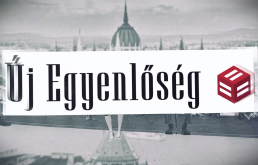
In 2025, the New Equality podcast was produced with the support of Policy Solutions and FEPS. Here is our selection from the past year’s episodes!
More
This Policy Solutions research explores how the Hungarians see the quality of public services.
More
On 25-26 October 2024, the Foundation for European Progressive Studies (FEPS), in collaboration with Solidar, the Group of Socialists & Democrats in the European Parliament (S&D), and Hungarian progressive foundations will organise the “Call to Europe” conference in Budapest. Policy Solutions is proud to be official Hungarian partner of this prestigious international conference.
More
This book, edited by Ania Skrzypek, FEPS Director for Research and Training, and András Bíró-Nagy, Director at Policy Solutions, and published by Palgrave Macmillan, analyses three decades of political developments within the Czech Republic, Hungary, Poland, and Slovakia.
More
This research explores how Hungarians perceive the quality of public services and what changes they have experienced during the 12 years of the Orbán government.
More
Book launch of “Rate your state: Public services in Hungary ” – a new publication by Policy Solutions. The event will take place on 1 December 2022.
More
Policy Solutions is the official Hungarian partner of Progressive Governance Summit. Rewatch the highlights of Europe's largest conference for progressive politics!
More
New book on how European and global social democracy can steer a course through the crises, featuring a chapter by our director András Bíró-Nagy on Hungary.
More
This publication reveals how Hungarian society has experienced the past year of the COVID-19 pandemic, and how they evaluate the Orbán government’s crisis management efforts.
More
This publication presents the opportunities for green-left politics in Hungary in the context of the economic and social crisis caused by the COVID-19 pandemic.
More
We cordially invite you to the online book launch of “The prospects of green-left politics in Hungary”, a joint publication by Policy Solutions and Friedrich-Ebert-Stiftung.
More
As official partners of the Progressive Governance Summit, we highly recommend to join the discussion between 15 and 19 June 2020 about a progressive agenda for a new normality in the post-pandemic world.
MoreThe central objective of this book is to offer potential and effective answers to NGOs, politicians or anyone who wants to counter populism.
MoreThe Friedrich-Ebert-Stiftung, Új Egyenlőség online magazine and Policy Solutions cordially invite you to their joint Public Discussion, entitled: Political Values of the Hungarian Society - From death penalty to universal health care
More
Policy Solutions considers it as an absolute priority that at the beginning of the new parliamentary term the conclusions on which the opposition can establish its strategy for the next years should be made on the basis of facts and figures. “Social democratic values in Hungary”, the joint publication of Policy Solutions and Friedrich-Ebert-Stiftung aims to contribute to this process by surveying the public acceptance of the key pillars of social democratic values in Hungary.
More
We cordially invite you to the joint conference of Foundation for European Progressive Studies (FEPS), Policy Solutions and Táncsics Foundation entitled ’A new path for the centre-left in Central and Eastern Europe?’. Date and time of the event: 25 November 2016 (Friday), 10:00-15:00. Venue: Akadémia Klub (1051 Budapest, Széchenyi tér 9.)
MoreThe Policy Solutions and the Foundation for European Progressive Studies (FEPS) cordially invite you to their joint conference, entitled ‘Political Attitudes of the Millennial Generation in Hungary and Central and Eastern Europe'.
More
European politics has become dominated both by new populist actors and the refugee crisis. If the left is to live up to these two challenges in the coming months and years, it needs to re-establish its capacity to set the political agenda away from questions of immigration and security. Tamás Boros' analysis in the Policy Network Observatory.
MoreThis publication is a comprehensive overview of developments, events and trends in Hungary in 2015. It focuses on four broad areas.
More
We cordially invite you to the official book launch of “Hungarian Politics in 2015”, a joint annual review of Friedrich Ebert Stiftung and Policy Solutions.
More
We proudly announce that Policy Solutions has been approved as Hungarian member of the European Network of the Foundation for European Progressive Studies (FEPS). Consequently, Policy Solutions and FEPS are going to work together in numerous research programmes, especially in the fields of populism, European democracy and contemporary social democracy.
More
Friedrich Ebert Stiftung and Policy Solutions have jointly decided to hold a conference entitled ’The far-right and the mainstream’. The conference aims to provide an in-depth investigation of the interaction between the far-right and mainstream politics.
More
In following up on the success of our international think tank meeting on the state of the European left-wing parties last November, the Friedrich Ebert Stiftung - Budapest and Policy Solutions organized a meeting on the subject of Inequalities in the European Union, which was held in Budapest on 10-11 June 2015.
More
We cordially invite you to our international conference entitled “Illiberal democracies in Europe”.The event will be held on the 28th of November 2014, and is organized by the Brussels-based Foundation for European Progressive Studies together with Táncsics Mihály Foundation. The event’s professional partner is Policy Solutions.
More
On 23rd July 2014 in Budapest, Policy Solutions and the European Values Think Tank (EV TT), a Prague-based public policy research institute, organized a National Seminar on political communication of integration of minorities, consisting of a roundtable discussion and public debate.
More
We are pleased to invite you on behalf of European Values Think-Tank and Policy Solutions, in cooperation with Wilfried Martens Centre for European Studies to a Public Debate, titled „Why and How Should Politicians Communicate Integration of Minorities?".
More
The election is over and it has ended in a clear victory for the governing party, Fidesz. This was the first sentence of our analysis in April, and it is the first sentence again. Apart from that, the election was primarily an internecine competition on the left and a battle between the far-right and the left. MSZP loses the former and the left wins the latter.
More
At the 2014 elections to the European Parliament, the European Socialists could attain a relative majority of votes, thereby overtaking the conservative People's Party for the first time in two decades - thus a comprehensive analysis by the Hungarian political research institute Policy Solutions, which reviewed the state of public opinion in all 28 member states.
More
With the agreement between Gordon Bajnai and Attila Mesterházy, the left is finally making genuine advances towards an electoral alliance for 2014. But many key issues remain unresolved and there are numerous crucial details that might lead to conflicts down the road.
More
Gordon Bajnai came close to declaring his candidacy for prime minister, but ultimately shrank back from a pledge to run.
More
The political parties on the left are lucky that they had no major events planned for the 23 October commemoration of the 1956 revolution, for they would have been upstaged by the pre-announced announcement of former Prime Minister Gordon Bajnai’s return to political life.
More
More than the polling results of individual opposition parties, the question of whether a comprehensive left-wing alliance can be formed has emerged as the crucial issue in terms of evaluating the potential for a government change in 2014.
More
At halftime, the opposition is in much the same bad shape as Fidesz.
More
Though he took the helm in troubled times, Gordon Bajnai’s premiership is widely considered a brief period of stability in the long period of chaos that has characterised Hungarian politics over the past years.
More
On January 2nd Fidesz took a little break and celebrated itself and its new Fundamental Laws at the Budapest Opera. After slightly over a week without a demonstration, the opposition, too, gathered for the occasion, though in a less celebratory mood than the official guests.
More
Well-attended as civil rallies may be, in the long-run Fidesz can only be defeated at the ballot box. One of the prominent organisations behind the street demonstrations, 4K!, has drawn the appropriate conclusion and is turning into a political party. Others may follow.
More
The demonstrations of March 15th were above all an opportunity to demonstrate strength. As was expected, Fidesz succeeded. Surprisingly, the left-of-centre opposition displayed impressive strength in the streets for the first time in years. As of yet, this opposition is not willing to align itself politically.
More
The opposition can’t yet sway the masses, but Fidesz may gradually awaken the left-wing base from its deep slumber. Just in case, the left leaning parties and organisations are vying to offer them a wide and growing selection of leaders and organisations.
More
For the Socialists, there is a long tunnel ahead and it is far from clear whether the flickering lights in the distance herald redemption or just another station in the purgatory.
More
Meet the most prominent MSZP candidates who may put small dents in Fidesz’ aura of invincibility and find out why.
More
Budapest’s longtime mayor was extremely successful politically, but he outstayed his welcome.
MoreThis Policy Solutions research explores how the Hungarians see the quality of public services.
Download analysisThis research explores how Hungarians perceive the quality of public services, and what changes they have experienced during the 12 years of the Orbán governments.
Download analysisThe goal of the joint research by Policy Solutions and Friedrich-Ebert-Stiftung was to find out how Hungarian society has experienced the past year of the COVID-19 pandemic, and how they evaluate various aspects of the Orbán government’s crisis management
Download analysisThis publication presents the opportunities for green-left politics in Hungary in the context of the economic and social crisis caused by the COVID-19 pandemic.
Download analysisWhy Europeans vote for populist parties and how Progressives should respond to this challenge
Download analysisWhat kind of future do Hungarians dream of for themselves and their country?
Download analysisPolicy Solutions - FES Budapest research report on the popularity of social democratic values in Hungary and the credibility of political parties in left-wing issues.
Download analysisPolicy Solutions - FEPS study on how progressive parties handled the migration crisis in central Europe
Download analysisExecutive summary of the FES – Policy Solutions study on the activities of Hungarian MEPs since 2014
Download analysisPolicy Solutions’ study aims to present Hungarian public attitude concerning socioeconomic changes twenty-five years after the regime change.
Download analysisThe study presents the apparent similarities and differences in the region through case studies and a comparison of social democratic parties in seven Central and Eastern European countries.
Download analysisA study reviewing how politicians in central and eastern Europe have responded to the current refugee crisis.
Download analysisThe results of the Millennial Dialogue international youth research in regional comparison
Download analysisData and their interpretation for the FES-Policy Solutions International Think Tank meeting
Download analysisAn analysis and interpretation of the social democratic parties’ results in the 2014 EP election
Download analysisAnalysis of the Eurobarometer data on European public mood
Download analysisHungarian Politics In-Depth - Election Edition, 26 May 2014
Download analysisPolicy Solutions' study for the Foundation for European Progressive Studies
Download analysisHungarian Politics In-Depth - Election Edition, 15-30 April 2014
Download analysisHungarian Politics In-Depth - Election Edition, 1-14 March 2014
Download analysisHungarian Politics In-Depth - Election Edition, 1-14 January 2014
Download analysisPolicy Solutions' Working paper for the Friedrich Ebert Stiftung
Download analysisHungarian Politics In-Depth, 2012, Week 43
Download analysisHungarian Politics In-Depth, 2012, Week 37
Download analysisHungarian Politics In-Depth, 2012, Week 2
Download analysisPolicy Solutions' analysis for the Friedrich Ebert Stiftung in German
Download analysisHungarian Politics In-Depth, Week 44
Download analysisHungarian Politics In-Depth, Week 39
Download analysisPolicy Solutions is a progressive political research institute based in Budapest. It was founded in 2008 and it is committed to the values of liberal democracy, solidarity, equal opportunity, sustainability and European integration. The focus of Policy Solutions’ work is on understanding political processes in Hungary and the European Union. Among the pre-eminent areas of our research are the investigation of how the quality of democracy evolves, the analysis of factors driving euroscepticism, populism and the far-right, and election research.
Follow us on Facebook!